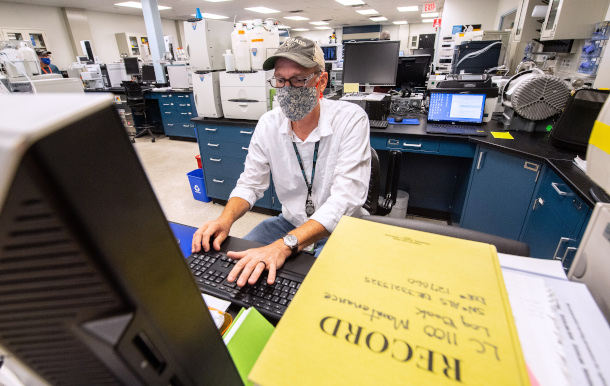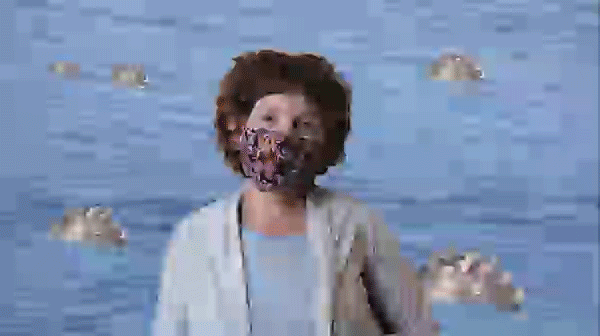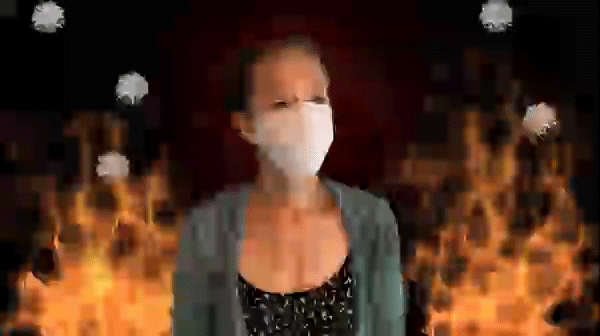Troubles For Science Research In The Pandemic
Air Date: Week of December 4, 2020

To adapt to COVID-19 precautions, many scientific researchers have had to socially distance while at work, if they have been able to continue their research. (Photo: Dennis Schroeder, National Renewable Energy Lab, Flickr, CC BY-NC-ND 2.0)
When the world started locking down in response to the COVID-19 pandemic, scientific researchers were not exempt from having to adapt their jobs to social distancing and remote working. Jes Burns of Oregon Public Broadcasting brings us the story.
Transcript
CURWOOD: The Coronavirus pandemic has affected nearly every aspect of life and society, including the ways in which some scientific research is conducted. A number of laboratories have had to shut down and funding has become more of a challenge. Oregon Public Broadcasting reporter Jes Burns has the story.
BURNS: During the early days of the pandemic, whether or not you had a backbone could have been the difference between life and death. At least if you were a lab animal.
BRANDER: OSU would let you take care of fish during the shutdown, but invertebrates were not considered to be, I guess, important enough.
BURNS: Not being able to access her lab was a problem for Oregon State University researcher Suzanne Brander. She studies how microplastics and chemical pollutants affect sea life, including the lowly, spineless mice and shrimp that plays a big role in the ocean food web.
BRANDER: And so that's why we decided to move the mice shrimp cultures home and the best place to put them was my basement.

Animated GIF of Oregon State University ecotoxicologist, Susanne Brander. (Photo: Courtesy of Jes Burns)
BURNS: There she cared for them with her kids for several months. By summer, the shrimp were back home on the Corvallis campus. But things were not back to normal, and they still aren't. Fewer researchers can access the lab at the same time and all the workstations have been spaced out. Although this might be a good thing if you weren't next to grad student Catherine Lasdon who counts microplastics in the dissolved intestinal tracts of Oregon rockfish.
LASDON: It smells bad, I'm warning you.
BURNS: But the real concern for Brander is money. Much of her lab's research, staffing and supplies is funded by grants.
BRANDER: It's hard because it's not as if you can ask a funding agency that's giving you a grant for more money. So you have to kind of stretch it out and make it work even though you're missing a three or four month chunk of time.
BURNS: The grant money crunch is also being felt by Oregon Health and Science University's Nicole Bowles, who studies the effects of irregular sleep cycles on cardiac health and firefighters. She thinks money is especially of concern for early career scientists.
BOWLES: As a young investigator who's trying to build my research portfolio, every dollar really really does count.
BURNS: She says senior researchers seem to be more secure.
BOWLES: I've already seen it. I'm thinking about a talk I went to in May and an established researcher, they were able to like flourish during this time. It was like they seem to be writing a paper a week, you know, whereas I'm trying to figure out like, how am I going to make it work?
BURNS: While concerns over funding are widespread, in some cases, the interruption of the research itself is the most acute loss. Every summer, the nonprofit Klamath Bird Observatory monitors migratory bird populations in rural Southern Oregon, using a crew of budding scientists from all over the world. Director John Alexander says when the pandemic hit, they realized something very quickly.
ALEXANDER: We cannot be vectors into rural communities where we do this work.
BURNS: The observatory told their crew to stay home. And consequently, for the first time in 25 years, their bird counts didn't happen.

Animated GIF of Oregon Health and Science University occupational health researcher, Nicole Bowles. (Photo: Courtesy of Jes Burns)
STEVENS: It's a huge setback when you have these long term data sets to miss a year of data.
BURNS: Science Director Jamie Stevens says the stakes are high. A recent study found that the US and Canada had lost 3 billion birds in the past 50 years. And the observatories long term data provide the backbone of policy changes that could help reverse the trend.
STEVENS: It's just incredibly urgent right now. So of all the things that put on, put on pause for a year. It's just all getting a little behind when we don't have time to get behind. We need to be taking actions like a decade ago.
BURNS: Scientists say in the institutions they work for are figuring out how to push the research forward in a pandemic world. Plastics researcher Brander says she feels like she's successfully ridden out the first wave.
BRANDER: For now we're, we're okay. It's not great. But we can manage.
BURNS: But with record surge in cases, she's concerned about the future.
BRANDER: I'm terrified about what things are going to look like after Thanksgiving, especially seeing and hearing about the numbers of people who are planning on still traveling or having family from out of town.
BURNS: So far, Oregon State is allowing the labs to remain open. But if case counts get much higher, Brander fears another complete shutdown of her lab could be coming. I'm Jes Burns reporting.
CURWOOD: Her story comes to us courtesy of Oregon Public Broadcasting
Links
See more about this story at the Oregon Public Broadcasting website
Living on Earth wants to hear from you!
Living on Earth
62 Calef Highway, Suite 212
Lee, NH 03861
Telephone: 617-287-4121
E-mail: comments@loe.org
Newsletter [Click here]
Donate to Living on Earth!
Living on Earth is an independent media program and relies entirely on contributions from listeners and institutions supporting public service. Please donate now to preserve an independent environmental voice.
NewsletterLiving on Earth offers a weekly delivery of the show's rundown to your mailbox. Sign up for our newsletter today!
 Sailors For The Sea: Be the change you want to sea.
Sailors For The Sea: Be the change you want to sea.
 The Grantham Foundation for the Protection of the Environment: Committed to protecting and improving the health of the global environment.
The Grantham Foundation for the Protection of the Environment: Committed to protecting and improving the health of the global environment.
 Contribute to Living on Earth and receive, as our gift to you, an archival print of one of Mark Seth Lender's extraordinary wildlife photographs. Follow the link to see Mark's current collection of photographs.
Contribute to Living on Earth and receive, as our gift to you, an archival print of one of Mark Seth Lender's extraordinary wildlife photographs. Follow the link to see Mark's current collection of photographs.
 Buy a signed copy of Mark Seth Lender's book Smeagull the Seagull & support Living on Earth
Buy a signed copy of Mark Seth Lender's book Smeagull the Seagull & support Living on Earth

